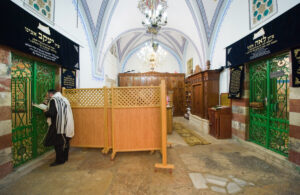Cover Story
If we pay attention and do it right, wearing clothing is a big tikkun (correction) for the sin of eating from the Tree of Knowledge…
“She grabbed [Yosef] by his garment… and he fled outside” (Genesis 39:12).
“The sea saw and fled” (Psalms 114:3).
Because Yosef fled, the sea fled (Bereishit Rabbah 87:8).
If we pay attention and do it right, wearing clothing is a big tikkun (correction) for the sin of eating from the Tree of Knowledge, when we lost the ability to see the reality of things and began to mistake the surface for the depth, the wrapper for the content. Adam’s heels shone like the sun (Tanchuma, Acharei #2), so certainly the higher body parts shone with more glory, the face most of all (Pesikta d’Rav Kahana 12:1). Clothing filters the bright spiritual “lights” of the various body parts, especially those that can create and nourish human life. Dressing right means that anyone who sees you can tell from your wardrobe that you’re Jewish. It means that you don’t wear torn or dirty clothing and that you take proper care of your clothes
Rebbe Nachman teaches that the yetzer hara (evil inclination) grabs a person by his clothing. We need to wear clothing, but the yetzer hara creates in our mind unnecessary “needs” for clothing. These “needs” become distractions, disturbing and hindering a person’s service of God. Such “needs” arise if one lets the outside become more important than the inside
Yosef HaTzaddik faced a natural temptation and had an opportunity to show his power and importance. But that was the outside, the “clothing” that was external to him, not his truly defined self. When the Israelites reached the bank of the Red Sea, the sea saw Yosef HaTzaddik’s coffin and understood that the outside— showing its power and running its natural course, what God usually intended it to do—was not as important as the inside— i.e., the ultimate purpose, doing what God wanted it to do now.
For Yosef HaTzaddik, as tzaddik (one who protects his [and the world’s] connection to God by being scrupulous in his moral behavior], clothing plays an especially important role. In this week’s reading, Yaakov gives Yosef the many-colored robe, his brothers strip him of that (and all his clothing), and his boss’ wife also grabs him by “his garment.” Mrs. Potiphar’s craving was not 100% material lust. From her astrology, she knew that he and she would have a common descendant (Bereishit Rabbah 85:2). (This does not absolve of her crimes.) For a year’s time, this wicked woman tried hard to seduce the tzaddik by changing her outfit every morning and evening (Yoma 35b).

Indeed, Yosef was on the verge of caving in, of doing “the job” (Bereishit Rabbah 87:7). But he ran outside, he changed his place (Aleph-Bet Book, Hirhurim B:23). The consequences weren’t pretty. He suffered the humiliation of being discovered in public in his birthday suit (Me’am Loez, p. 313), he was libeled and publicly maligned for ten years, and he was jailed, without parole. (And there in jail, Mrs. Potiphar continued her evil efforts [Bereishit Rabbah 87:10]!) Yet by shaking himself free, Yosef is bedecked in all manner of royal raiment, by Pharaoh himself (Genesis 41:42). Although Yosef understood the tikkun of clothing, he saw that it could be usurped and misused, that if grabbed by the yetzer hara, it has to be discarded.
The lesson for us? Our use of an “external” tikkun is vulnerable to attack. We have to be wise enough and flexible enough to know when to abandon it even if it means a drastic and unforeseen change in circumstances for the worse. In the merit of the genuine tzaddikim, may God grant us the wisdom and strength to make every tough decision we will ever need to make. Amen!
(Based on Sichot HaRan (Rabbi Nachman’s Wisdom) #100)
- 0 comment






















